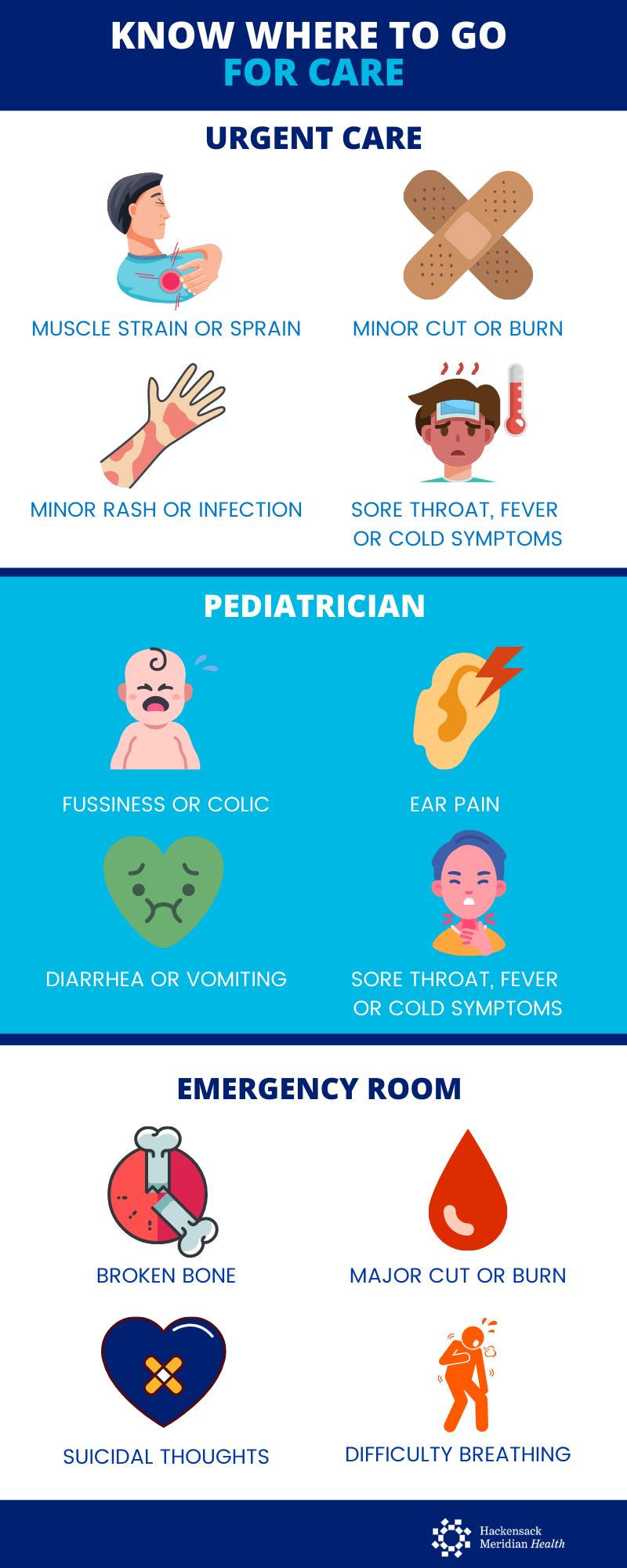When to Go to the ER vs. Urgent Care vs. Pediatrician

December 22, 2021
By: Katie Woehnker
When your child gets sick, it can be hard to know - should you go to the emergency room (ER), urgent care or pediatrician?
David M. Walker, M.D., Chief of Pediatric Emergency Medicine at the Joseph M. Sanzari Children’s Hospital at Hackensack University Medical Center, shares tips on what to do when your child is ill or injured and how to determine what level of care is needed.
Stay calm, and assess the situation.
“This may seem obvious, but some parents get so frazzled they don’t stop to think about what their child is experiencing,” Dr. Walker reflects. “In most cases, you have time, so try to stay calm; take a second to analyze the situation. Sometimes the answer will be clear whether they require an ER visit or a call to the pediatrician.”

Call your pediatrician.
“When the situation is not so clear, consult your child’s regular care provider for advice on where to seek care,” advises Dr. Walker.
For a short-notice appointment, many pediatric offices offer a telehealth option that allows your provider to consult with you and your child by video. HMH 24/7 also offers same-day telehealth appointments with board-certified Hackensack Meridian Health physicians.
“If the situation is emergent, your pediatrician can call the ER ahead of your visit to help make the transition easier,” Dr. Walker mentions. Before your arrival, the doctors onsite will be aware of the situation and better prepared to begin care.
“We are here to help make those choices. Stay calm, and know wherever you go, your child will be taken care of,” says Dr. Walker.
Don’t hesitate to call poison control - (800) 222-1222.
“Poison control centers are an underused resource. That phone number is good anywhere in the United States. It will link you to the nearest poison control center,” shares Dr. Walker. “They are not just for pills or medications, they can help with anything that your child ingests, like coins, batteries, or plants. They will advise if your child needs emergency care, or if they are safe to be monitored at home.”
If you need to go to the emergency room, sometimes it’s better to call 911 instead of driving.
“If you are too anxious and won’t be able to pay attention to the road, call 911. The last thing we want is a scared parent constantly checking the back seat instead of focusing on the road ahead - that puts the parent and others at risk,” warns Dr. Walker. “By using EMS, you can focus on taking care of your child, and care can be started as soon as EMS provider sarrive to your location”
Work on prevention measures.
“I always tell parents to get on their knees and crawl around their houses to see what their child can get into,” shares Dr. Walker. “If they take the time to implement some safety measures, like childproofing electrical outlets, making sure they wear a helmet, or using gates, they can help prevent a lot of accidental injury.”
Next Steps & Resources:
- Meet our source: David M. Walker, M.D.
- To make an appointment with a doctor near you, call 800-822-8905 or visit our website.
- Register for telemedicine through HMH Care NOW
The material provided through HealthU is intended to be used as general information only and should not replace the advice of your physician. Always consult your physician for individual care.






